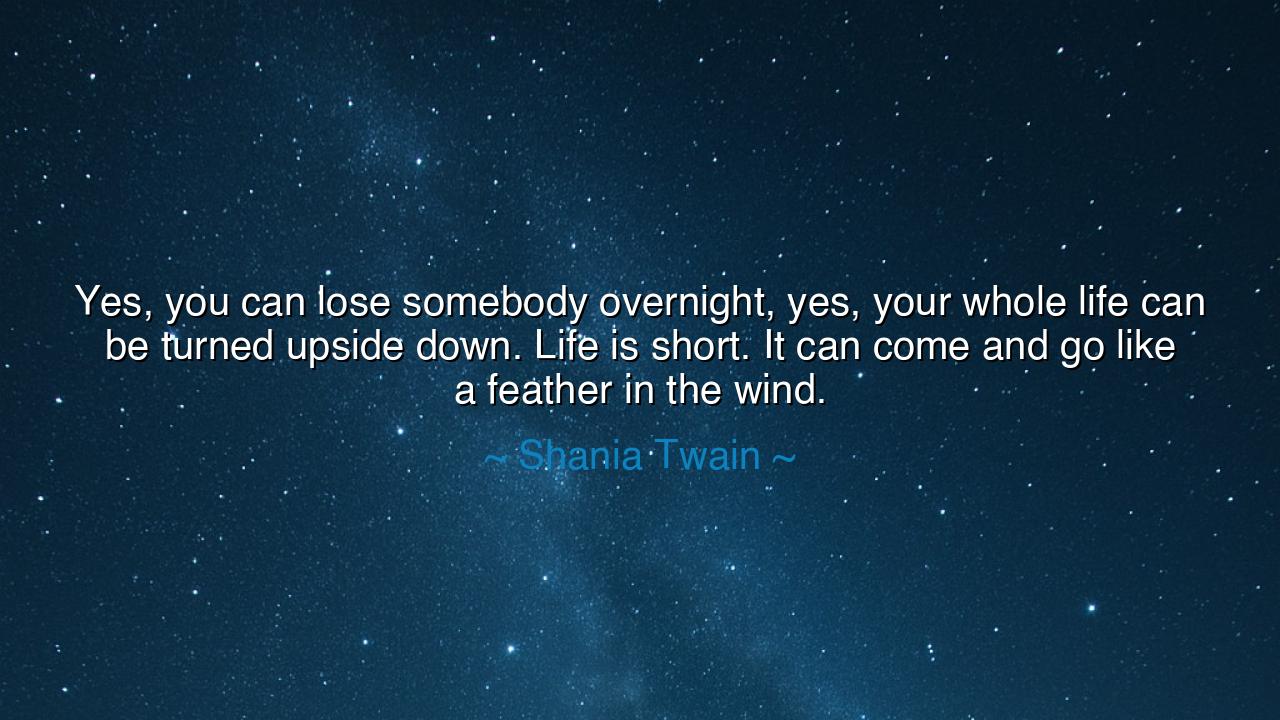
Yes, you can lose somebody overnight, yes, your whole life can be
Yes, you can lose somebody overnight, yes, your whole life can be turned upside down. Life is short. It can come and go like a feather in the wind.






In the fleeting span of life, there is a truth that is often hard to swallow: everything we hold dear—our relationships, our possessions, our health—can change in an instant. The words of Shania Twain, "Yes, you can lose somebody overnight, yes, your whole life can be turned upside down. Life is short. It can come and go like a feather in the wind," carry a wisdom that echoes through the ages. Like the wind, life moves with such unpredictability and fragility that it is impossible to hold onto anything forever. In a moment, everything can change—just as a feather is carried away by the breeze, so too are we carried through the winds of fate and circumstance, subject to forces beyond our control.
The ancients understood this truth deeply. The Greek philosophers, especially Heraclitus, spoke of the constant flux of existence. He famously stated, "You cannot step into the same river twice," reminding us that everything is in constant motion. Life is ever-changing, like the river that flows relentlessly toward the sea, and we, like the waters, are swept along by its current. The Stoics too, such as Marcus Aurelius and Epictetus, embraced the transient nature of life. They taught that we must accept the impermanence of all things and learn to live with equanimity—to endure loss and hardship without being broken by it. For they knew, as Twain’s words imply, that life is short, and the more we resist its natural flow, the more we suffer.
Consider the story of Alexander the Great, who, at the height of his conquests, had the world seemingly at his feet. Yet, in a single moment, his life was turned upside down. After years of military success, Alexander fell ill and died suddenly at the age of 32, leaving behind an empire that was destined to fracture. The vast empire he had built crumbled, as kingdoms quarreled and warlords vied for power. In his death, we see the profound truth of Twain's words: life can be lost in an instant, and no matter how powerful we are, we are ultimately subject to the winds of fate.
Twain’s reflection also speaks to the impermanence of human connections. Friendships, relationships, and loved ones can be swept away just as easily as a feather in the breeze. Think of Julius Caesar, whose life, though rich in power and glory, was cut short in a single moment by the betrayal of those closest to him. His assassination was not only a political event but a personal tragedy, a reminder that even the most secure and influential among us can lose everything in an instant. Caesar’s death shattered not only his empire but the lives of those who depended on him, illustrating the profound truth that loss is often sudden and unforeseen.
The lesson in Twain's words is clear: life is fragile, and its unpredictability should compel us to live each moment with awareness and gratitude. It is easy to become consumed by the mundane tasks and struggles of daily life, to fixate on what we lack or what we wish to achieve. But when we acknowledge the brevity of life, we are reminded that our time here is not guaranteed. We must learn to cherish what we have and those around us, knowing that in an instant, everything could change. The ancient wisdom of Epictetus, who taught that we cannot control the events of our lives but can only control our responses, offers a powerful guide. By accepting the impermanence of life, we free ourselves from the grip of fear and regret and can live more fully in the present.
In our own lives, let us take this wisdom to heart: let us cherish each moment, knowing that the path ahead is uncertain and ever-changing. Gratitude is the antidote to the fear of loss, for it teaches us to value the present rather than worry about the future. Let us love deeply, speak kindly, and act with purpose, for in doing so, we honor the fragility of life. Like the feather in the wind, we are temporary, but the love, the joy, and the meaning we create in our short time can leave a lasting mark on the world.
In conclusion, Shania Twain’s words serve as a reminder that life, though precious, is short. Let us embrace its impermanence, live with intention, and cultivate gratitude for each fleeting moment. Through awareness of our vulnerability and the inevitability of change, we find the strength to live with more purpose and meaning, making the most of the time we have and leaving behind a legacy that outlasts the winds that carry us.






AAdministratorAdministrator
Welcome, honored guests. Please leave a comment, we will respond soon